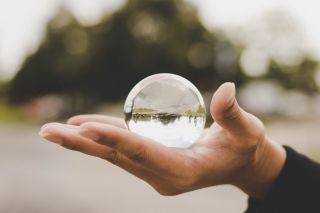Meditation
Curiosity Is a Key to Well-Being
Why asking more questions can change your life.
Posted January 18, 2023 Reviewed by Ekua Hagan
Key points
- Curiosity is a key component of well-being, and cultivating it is a skill that can be learned.
- Well-being practices supported by meditation can help one cultivate curiosity about the distortions coloring one's thoughts.
- Granting oneself compassion can increase the likelihood of forming a new habit.

By Raquel Tatar Ph.D., Tammi Kral, Ph.D., and Caitlin Roa Ph.D.
We are all born curious. As the world around us continues to change, so do the questions we have about it; our ability to flourish depends on us leaning into the wonders we have about the world within. One of the simplest ways to begin improving our well-being is to ask these fundamental questions: “What?” “How?” and “Why?”
The trait of curiosity is not just reserved for children—psychologists and neuroscientists from around the world have found that curiosity is a driving force for exploration and critical for healthy development and learning. Practicing curiosity is associated with enhanced psychological well-being, grit, subjective happiness, and meaning in life, as well as lower rates of depression and fewer negative emotions.
Curiosity and Behavior Change
Scientists are paying much closer attention to the role that curiosity plays in behavior change, especially considering its role in mindfulness-based interventions. When we experience tension or disagreement with another person, it can be helpful for conflict resolution and bias reduction to wonder how their experiences may be shaping their beliefs and behavior. Curiosity is about continually stopping to ask questions. When those questions are open-ended and directed at our own thoughts and assumptions, we can gain insight and self-knowledge.
Here are some questions you can ask:
- What factors in their everyday life could be influencing their reaction?
- How do my experiences differ from theirs?
- Why are they reacting this specific way?
- How are my experiences influencing my perception of the situation?
When we’re able to understand how perspectives other than our own come to be, we are cultivating the skill of empathy, a seed from which compassion can grow.

Compassion and Habit Formation
This skill of compassion can be used on ourselves, too. In fact, it’s in our nature to be compassionate. But it is often our own beliefs about our ability to change that hold us back. Grant yourself the same compassion that you would give to others by questioning those beliefs—once you do, you can increase the likelihood of forming a new habit.
Here are a few questions you can ask yourself to redirect your perspective:
- How have I successfully changed my behaviors in the past?
- Are there any obstacles to making a change, and what support do I need to overcome them?
- In what ways would this change benefit me, my loved ones, and my community?
- What would it look like to prioritize this change in my life and make a concrete plan to do so?
Some evidence also indicates that curiosity may enhance learning and memory through the activation of brain regions involved in the anticipation of rewards. That’s right: Being curious feels good in the same way as a warm embrace, leading to even greater chances of developing a habit.
Meditation and Neuroplasticity
Much like other well-being skills, neuroplasticity research has shown that it is possible to train yourself to be (more) curious. Neuroplasticity is our brain’s ability to change in response to experience. Even better, this practice of training the brain doesn’t require special knowledge, tools, or taking significant time out of your day. At Healthy Minds Innovations, we have found that well-being practices supported by meditation can help us cultivate curiosity about the potential distortions coloring our thoughts.
Through meditation, we can learn to recognize how our thoughts and reactions are being influenced. And good news: Meditation does not need to happen only when sitting down. We can practice active meditation while doing daily activities such as brushing our teeth or cleaning the dishes. Over time, this awareness will help us to strengthen our perceptions and behaviors in healthier ways, leading to greater self-knowledge. The key to turning curiosity into insight is to refrain from criticism and all-or-none thinking, and instead accept the multitude of possibilities and continue asking questions.
Being curious is a skill that can (and should) be practiced often. (We've found that this app is a good place to get started.) Well-being training is a pursuit that may ebb and flow throughout our lives, but at every stage, change is possible if we remain curious.




